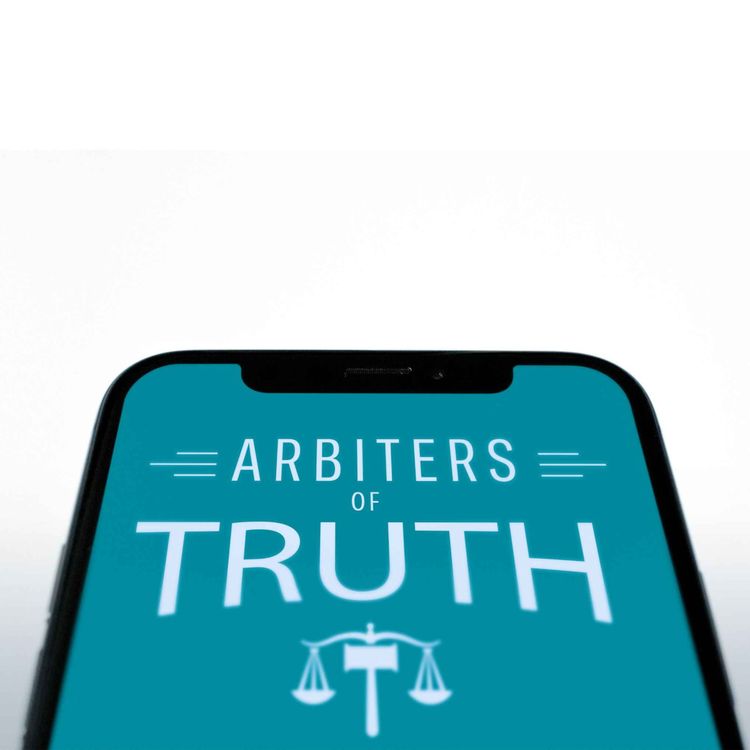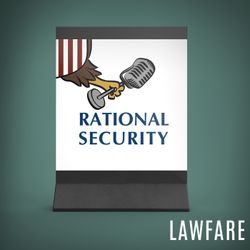Share

The Lawfare Podcast
You Can’t Handle the Truth (Social)
Almost immediately since he was banned from Twitter and Facebook in January 2021, Donald Trump has been promising the launch of a new, Trump-run platform to share his thoughts with the world. In February 2022, that network—Truth Social—finally launched. But it’s been a debacle from start to finish, with a lengthy waitlist and a glitchy website that awaits users who finally make it online.
Drew Harwell, who covers technology at the Washington Post, has been reporting on the less-than-smooth launch of Truth Social. This week on Arbiters of Truth, our podcast series on the online information ecosystem, Evelyn Douek and Quinta Jurecic spoke with him about who, exactly, this platform is for and who is running it. What explains the glitchy rollout? What’s the business plan … if there is one? And how does the platform fit into the ever-expanding universe of alternative social media sites for right-wing users?
More episodes
View all episodes

Lawfare Archive: Memorializing Babyn Yar after the Russian Invasion of Ukraine
44:45|From July 1, 2022: When a Russian missile recently struck a TV tower in Kyiv, near Babyn Yar, the site of Nazi mass murders during the Holocaust, some saw the attack as a potent symbol of the tragic occurrence of violence in Ukraine. To talk through the historical significance of the attack, Lawfare Managing Editor Tyler McBrien sat down with Maksym Rokmaniko, an architect, designer, entrepreneur, and director at the Center for Spatial Technologies in Kyiv, and Linda Kinstler, a PhD candidate in the rhetoric department at UC Berkeley.In her recent New York Times essay, the Bloody Echoes of Babyn Yar, Linda wrote, "the current war in Ukraine is so oversaturated with historical meaning, it is unfolding on soil that has absorbed wave after wave of the dead, where soldiers do not always have to dig trenches in the forest because the old ones remain."Linda's writing has appeared in the New York Times, the Washington Post, the Atlantic and Jewish Currents, where she recently reported on the Babyn Yar Holocaust Memorial center. Linda is also the author of Come to This Court and Cry: How the Holocaust Ends, which is out in the U.S. on August 23rd, from Public Affairs.Tyler, Linda and Maksym discuss the history of Babyn Yar as a sight and symbol, the role of open source investigative techniques and forensic modeling in the documentation of war crimes, the battle over historical narratives, memorialization and memory, as well as the limits of the law in achieving justice for victims of negation and genocide.To receive ad-free podcasts, become a Lawfare Material Supporter at www.patreon.com/lawfare. You can also support Lawfare by making a one-time donation at https://givebutter.com/lawfare-institute.
Lawfare Daily: ‘Deportation, Inc.’ and the Rise of the Immigration Enforcement Economy
45:44|Lawfare Managing Editor Tyler McBrien sits down with SITU’s Deputy Director of Research Gauri Bahuguna, Detention Watch Network’s Advocacy Director Setareh Ghandehari, the American Immigration Council’s Policy Director Nayna Gupta, and Just Futures Law’s Executive Director Paromita Shah to discuss the rise of the immigration enforcement economy following the recent release of “Deportation, Inc.” a new video series from SITU and Lawfare. They talk about why the government outsources the critical immigration enforcement functions of deportation, interdiction, and deportation to the private sector, and how this system evolved into a multi-billion dollar industry.To receive ad-free podcasts, become a Lawfare Material Supporter at www.patreon.com/lawfare. You can also support Lawfare by making a one-time donation at https://givebutter.com/lawfare-institute.
Lawfare Daily: Trump Admin Attacks on Inspectors General with Cristin Dorgelo and Rob Storch
48:59|Lawfare Managing Editor Tyler McBrien sits down with Cristin Dorgelo, a former senior adviser for management at the Office of Management and Budget, and Rob Storch, who served as the inspector general of the Defense Department until the Trump administration fired him and many of his colleagues in January of this year. They discuss those firings, other Trump administration attacks on the offices of the inspector general, and various attempts by the administration to undermine oversight and evade accountability, all covered in a new report from the Center on Budget and Policy Priorities called “Trump Administration’s Undercutting of Oversight Hurts Taxpayers and Beneficiaries.”To receive ad-free podcasts, become a Lawfare Material Supporter at www.patreon.com/lawfare. You can also support Lawfare by making a one-time donation at https://givebutter.com/lawfare-institute.
Rational Security: The “Chestbursters Roasting on an Open Fire” Edition
01:22:27|This week, Scott down with his Lawfare colleagues Alan Rozenshtein and Ari Tabatabai to talk through a few of the week’s big national security news stories, including:“Once You Pop, You Can’t Stop.” The Trump administration has given a green light to Nvidia to export its powerful H200 chips to China, opening a potentially significant new market while jumpstarting China’s strategically significant AI industry—or, perhaps, making it reliant on U.S. technology. What explains this decision? And how does it align with the Trump administration’s broader reframing of strategic competition with China as a primarily economic problem, as reflected in its recent National Security Strategy?“Lavatories of Democracy.” Late last week, President Trump signed an executive order setting up a number of mechanisms intended to assert federal preemption over and otherwise deter state efforts to regulate the development and use of AI—an executive branch-only effort that followed a failed push to insert a related legislative provision into year-end omnibus legislation. How effective is this measure likely to be? And how wise is it to try and bar the states from regulating AI development and use in the first place?“Some Things You Can’t Make Light Of.” Over the weekend, a pair of gunmen inspired by the Islamic State executed a brutal massacre at a Hanukkah event on Australia’s Bondi Beach, killing 15 people and injuring 40. The violence has shocked Australia, a country with strict gun control laws where incidents of anti-semitism have been on the rise, as in much of the world. What is there to learn from the attack and its aftermath? And what could its ramifications be, both in Australia and further abroad?In object lessons, Alan tells us what the buzz is—seeing Jesus Christ Superstar live. Scott, heavy with Christmas spirit, shares his grandmother’s recipe for sour cream coffee cake (remember, during the holidays, dense=delicious). And Ari keeps us grounded with a recommendation of “Don’t Let’s Go To the Dogs Tonight,” a South African film about a White Zimbabwean family following the Rhodesian Bush War.Rational Security will be having its traditional end-of-year episode later this month, which will focus on listener-submitted topics and object lessons! If you have topics you want us to discuss and object lessons you want to share—whether serious or frivolous—be sure to send them to rationalsecurity@lawfaremedia.org by Dec. 21!To receive ad-free podcasts, become a Lawfare Material Supporter at www.patreon.com/lawfare. You can also support Lawfare by making a one-time donation at https://givebutter.com/lawfare-institute.
Lawfare Daily: Scott Anderson on How Social Media Platforms Should Handle Unrecognized Regimes
42:41|Lawfare Senior Editor Alan Rozenshtein speaks with Scott Anderson, Senior Editor at Lawfare, fellow in Governance Studies at the Brookings Institution, and non-resident senior fellow in the National Security Law Program at Columbia Law School, who recently wrote a report about how social media platforms should handle unrecognized regimes like the Taliban. They discuss how social media platforms responded to the Taliban's takeover of Afghanistan in 2021; the divergent approaches of Meta, YouTube, and X toward sanctioned entities and governmental accounts; the international law concepts of recognition and de facto authority; a proposed "de facto authorities rule" that would allow platforms to permit certain essential governmental functions by unrecognized regimes; and how this framework can be reconciled with U.S. and international sanctions requirement.To receive ad-free podcasts, become a Lawfare Material Supporter at www.patreon.com/lawfare. You can also support Lawfare by making a one-time donation at https://givebutter.com/lawfare-institute.
Lawfare Daily: Ukraine’s Asymmetric Blueprint in the Black Sea
38:31|At the start of the full-scale invasion of Ukraine, Russia held clear naval superiority in the Black Sea. Over the course of the war, Ukraine has developed an asymmetric maritime strategy using unmanned surface vehicles (USVs), achieving strategic effects against a superior naval force.Ukraine has largely shifted from importing complete drone systems to assembling them domestically using foreign components, with China remaining a key supplier of many critical parts. What is more, Ukraine is now preparing to export its drones internationally.In this episode, Katsiaryna Shmatsina, Eurasia Fellow at Lawfare, sits down with Cat Buchatskiy, the Director of Analytics at the Snake Island Institute, to discuss Ukraine’s maritime operations in the Black Sea, the use of drones, and the supply chains behind them. Cat leads a team of analysts producing frontline-validated research on modern warfare, defense innovation, and U.S.-Ukraine security cooperation. Read more from the Snake Island Institute on Ukraine's Black Sea’s Asymmetric Blueprint and the transformation of a once-nascent drone industry into a critical pillar of national defense.To receive ad-free podcasts, become a Lawfare Material Supporter at www.patreon.com/lawfare. You can also support Lawfare by making a one-time donation at https://givebutter.com/lawfare-institute.
Lawfare Daily: The Trials of the Trump Administration, Dec. 12
01:37:08|In a live conversation on YouTube, Lawfare Editor in Chief Benjamin Wittes sat down with Lawfare Senior Editors Anna Bower, Molly Roberts, and Eric Columbus and Lawfare Public Service Fellow Loren Voss to discuss next week's contempt hearings in J.G.G. v. Trump, the release of Kilmar Abrego Garcia from ICE custody, domestic deployments litigation, and moreYou can find information on legal challenges to Trump administration actions here. And check out Lawfare’s new homepage on the litigation, new Bluesky account, and new WITOAD merch.To receive ad-free podcasts, become a Lawfare Material Supporter at www.patreon.com/lawfare. You can also support Lawfare by making a one-time donation at https://givebutter.com/lawfare-institute.
Lawfare Archive: Introducing Allies: A Podcast Series from Lawfare and Goat Rodeo
35:41|From May 16, 2022: Today, Lawfare and Goat Rodeo released the first two episodes of Allies, a podcast series that traces the U.S.’s efforts to protect Afghan interpreters, translators and other partners through the Special Immigrant Visa (SIV) program. That effort culminated in the U.S. evacuation from Afghanistan in August 2021, when thousands of the U.S.’s local partners were left behind. In seven episodes, Allies will take listeners through the decade-long effort to honor America’s promises to its Afghan partners.Episode 1: “Faithful and Valuable Service” opens at the Kabul airport this past August, where the failure of the SIV program contributed to the chaos. Then, we rewind to just before 9/11, when the U.S. government had little regional, let alone linguistic, expertise on Afghanistan. After the invasion, that knowledge gap needed to be filled rapidly, so the U.S. began hiring local partners through military contractors. They became essential partners, and it was nearly impossible for any U.S. platoon, provincial reconstruction team or diplomat to operate without interpreters and translators. They were the U.S.’s eyes and ears. To receive ad-free podcasts, become a Lawfare Material Supporter at www.patreon.com/lawfare. You can also support Lawfare by making a one-time donation at https://givebutter.com/lawfare-institute.
Lawfare Archive: President-elect Trump's National Security Appointments
01:08:32|From November 16, 2024: Editor-in-Chief Benjamin Wittes sat down with Lawfare Senior Editors Scott Anderson, Alan Rozenshtein, and Quinta Jurecic and Executive Director of the Institute for Constitutional Advocacy and Protection Mary McCord about Donald Trump's picks for his Cabinet and senior-level administration positions, including Matt Gaetz as attorney general and Pete Hegseth as secretary of defense, the possibility of Trump using the recess appointment power, and more.Editor’s note: During a discussion of Robert F. Kennedy, Jr.’s nomination to head the Department of Health and Human Services, we mentioned a 2019 outbreak of measles in Polynesia. The outbreak took place in Samoa, not American Samoa as we mistakenly stated.To receive ad-free podcasts, become a Lawfare Material Supporter at www.patreon.com/lawfare. You can also support Lawfare by making a one-time donation at https://givebutter.com/lawfare-institute.